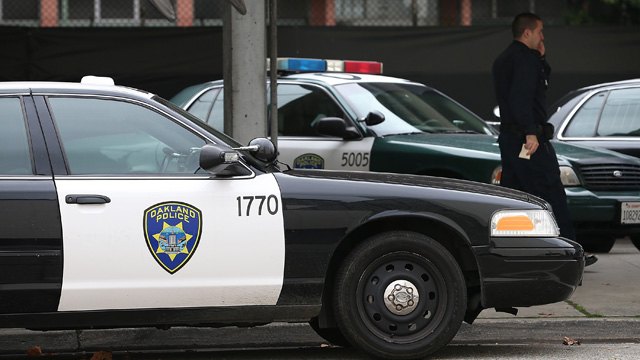Oakland PD Turns Over 4.6M License Plate Dataset Via Public Records Request
Via a public records request, the Oakland Police Department has turned over 4.6 million reads of 1.1 million unique plates recorded between 2010 and 2014.
Ars Technica made the request, resulting in the aforementioned license-plate reader dataset made between December 23, 2010 and May 31, 2014. The publication then hired a data visualization specialist to organize the dataset for its investigation into the practice.
With the permission of those contacted, the publication was able to track the movements of each individual based on their license plate, information that provides an insight into a given person’s life, according to University of California, Berkeley law professor Catherine Crump:
Where someone goes can reveal a great deal about how he chooses to live his life. Do they park regularly outside the Lighthouse Mosque during times of worship? They’re probably Muslim. Can a car be found outside Beer Revolution a great number of times? May be a craft beer enthusiast—although possibly with a drinking problem.
Crump adds that, as LPR technology comes down in price and becomes ubiquitous on the backs of police cars and in traffic lights, citizens should support restrictions on the data collected, from how long it’s stored and who can access it, to why it should be accessed in the first place.
Ars Technica also obtained data on OPD vehicles, discovering that a single unit — a 2007 Ford P71 — was scanned 879 times between January 15, 2012 and May 31, 2014 while it travelled through Downtown Oakland and North Oakland; nearly all of the 100 OPD in the dataset were also scanned several hundred times over.
As for how the publication was able to have this data in the first place, neither the OPD or the Oakland City Council has set a formal data retention limit; the police department deletes information as needed for new data, however. All OPD officers also have access to the LPR information at any time, and need not give a reason for accessing the data when searching for a given plate, though policy says such searches require “a legitimate law enforcement purpose, such as following up on a criminal investigation.”
Finally, OPD police captain Anthony Toribio explains that the data is publically available to anyone who asks, citing transparency as the reason:
I think it’s important for a law enforcement organization to be transparent, and it goes to being credible and establishing legitimacy in the community.
The OPD dataset is the second-largest LPR dataset to be released via request, the largest being one from a request by the American Civil Liberties Union to the Seattle Police Department in 2010. The request resulted in a dataset of over 7.3 million scans.
Seattle-based writer, blogger, and photographer for many a publication. Born in Louisville. Raised in Kansas. Where I lay my head is home.
More by Cameron Aubernon
Latest Car Reviews
Read moreLatest Product Reviews
Read moreRecent Comments
- Dave Holzman My '08 Civic (stick, 159k on the clock) is my favorite car that I've ever owned. If I had to choose between the current Civic and Corolla, I'd test drive 'em (with stick), and see how they felt. But I'd be approaching this choice partial to the Civic. I would not want any sort of automatic transmission, or the turbo engine.
- Merc190 I would say Civic Si all the way if it still revved to 8300 rpm with no turbo. But nowadays I would pick the Corolla because I think they have a more clear idea on their respective models identity and mission. I also believe Toyota has a higher standard for quality.
- Dave Holzman I think we're mixing up a few things here. I won't swear to it, but I'd be damned surprised if they were putting fire retardant in the seats of any cars from the '50s, or even the '60s. I can't quite conjure up the new car smell of the '57 Chevy my parents bought on October 17th of that year... but I could do so--vividly--until the last five years or so. I loved that scent, and when I smelled it, I could see the snow on Hollis Street in Cambridge Mass, as one or the other parent got ready to drive me to nursery school, and I could remember staring up at the sky on Christmas Eve, 1957, wondering if I might see Santa Claus flying overhead in his sleigh. No, I don't think the fire retardant on the foam in the seats of 21st (and maybe late 20th) century cars has anything to do with new car smell. (That doesn't mean new car small lacked toxicity--it probably had some.)
- ToolGuy Is this a website or a podcast with homework? You want me to answer the QOTD before I listen to the podcast? Last time I worked on one of our vehicles (2010 RAV4 2.5L L4) was this past week -- replaced the right front passenger window regulator (only problem turned out to be two loose screws, but went ahead and installed the new part), replaced a bulb in the dash, finally ordered new upper dash finishers (non-OEM) because I cracked one of them ~2 years ago.Looked at the mileage (157K) and scratched my head and proactively ordered plugs, coils, PCV valve, air filter and a spare oil filter, plus a new oil filter housing (for the weirdo cartridge-type filter). Those might go in tomorrow. Is this interesting to you? It ain't that interesting to me. 😉The more intriguing part to me, is I have noticed some 'blowby' (but is it) when the oil filler cap is removed which I don't think was there before. But of course I'm old and forgetful. Is it worth doing a compression test? Leakdown test? Perhaps if a guy were already replacing the plugs...
- Crown No surprise there. The toxic chemical stew of outgassing.


































Comments
Join the conversation
I'm more concerned that the data released is now "in the wild" where it could be misused by almost anyone. Yes, I agree that they proved how people's lifestyles can be determined; but is that really a bad thing when there is no concern? Such analysis when there IS a concern could far more readily help locate a criminal after a crime is committed or detect threats to individuals, groups or locations prior to an actual incident. Naturally such license plate tracking cannot be the sole basis for such concerns, but it can be used in conjunction with other detective work to prove their movements and even verify timing of events. More, it can help reduce individual crimes like stalking, kidnapping and rape by detecting patterns of presence in atypical areas, especially in the case where the victim has asked the police for protection. But as we all should know, any technology that can be used for good can also be used for ill. Imagine a scenario right here where someone suggested Ars Technica run this test just so they could access the data and stalk a target. Did Ars Technica really do good here, or did they enable a criminal through good intentions?
I saw this on Ars a couple days ago. Ars was trying to prove a point: that there's downsides to obtaining this data, and serious downsides to it's retention beyond a few hours/days. What Ars did, anyone could do. And frankly, anyone probably is doing this. One of the issues with big data isn't that it's collected, it's that, with storage and processing being so cheap, you can retain data for months/years and crunch it effortlessly. A few years back you'd have to be Google to do this; now you can just buy processor time on Azure/AWS/GCE and do it yourself. We can't really do squat about corporations hoarding data, but government, at least, is notionally accountable, and local governments are easiest to persuade. The problem is the whole "soft on crime/terror/drugs" mindset that makes it very hard to stop.